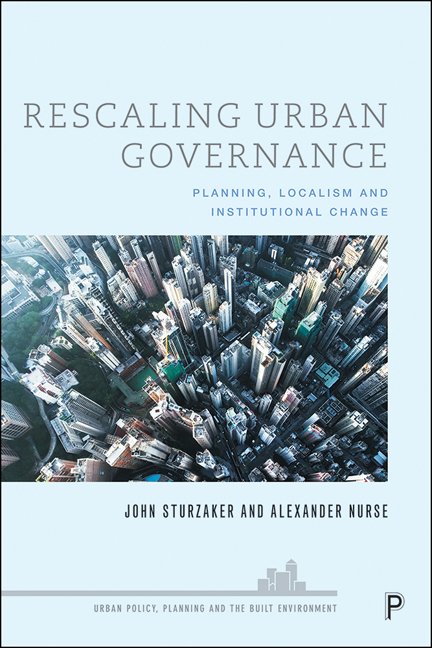Book contents
- Frontmatter
- Dedication
- Contents
- List of Tables, Figures and Boxes
- Notes on Authors
- Glossary
- Acknowledgements
- 1 Introduction: Planning Reform and State Spatial Rescaling
- 2 Devolution: A Patchwork Quilt of Planning Reform
- 3 Replacing the Regions: The evolution of English Subnational Reform
- 4 City Regions and the Cities Within Them: Connecting two Overlapping Scales
- 5 Local Authorities: Powerhouses or Scapegoats?
- 6 Community-led Governance: Opportunities and Constraints
- 7 Conclusion: Rescaling Urban Governance
- References
- Index
4 - City Regions and the Cities Within Them: Connecting two Overlapping Scales
Published online by Cambridge University Press: 03 March 2021
- Frontmatter
- Dedication
- Contents
- List of Tables, Figures and Boxes
- Notes on Authors
- Glossary
- Acknowledgements
- 1 Introduction: Planning Reform and State Spatial Rescaling
- 2 Devolution: A Patchwork Quilt of Planning Reform
- 3 Replacing the Regions: The evolution of English Subnational Reform
- 4 City Regions and the Cities Within Them: Connecting two Overlapping Scales
- 5 Local Authorities: Powerhouses or Scapegoats?
- 6 Community-led Governance: Opportunities and Constraints
- 7 Conclusion: Rescaling Urban Governance
- References
- Index
Summary
Introduction
In Chapter 3, we explored how the post-2010 devolution agenda has developed at the strategic level, framed as an agenda that has goals to realign the UK's economy by creating a series of agglomeration economies which could, on fruition, counterbalance the success of London. This discussion centred on a new economic orthodoxy that extols the benefits of agglomeration (for example, critical mass, economies of scale and enhanced connectivity), and suggests that city regionalism is the ‘natural’ level of governance for contemporary economic thinking (Pike et al, 2016). In doing so, however, Chapter 3 argued that while there is a wealth of rhetoric at this scale, the structures of regional governance that were abolished in 2010 have not been replaced but rather, there now exists a suite of effective ‘spatial imaginaries’ (Beel et al, 2018; Davoudi et al, 2018) that characterise the sub-national space. Devoid of significant statutory power, and amid limited efforts at strategic linkages, the rhetoric that surrounds devolution at this level far outpaces progress.
In this chapter we build on this discussion, developing our argument that while the sub-national rhetoric (that is, the Northern Powerhouse and the Midlands Engine) has dominated the headlines and the wider public conscience, the thrust of those reforms is primarily delivered at the city and city-regional level. In doing so, we explore the mechanics of devolution as it has manifested at this city and city-regional scale – moving beyond the broader reforms discussed in Chapter 3, and placing a greater focus on the practicalities of what is different for those tasked with policy delivery. This discussion largely centres on the democratic reforms relating to city and city region mayoralties, which can be argued as being the centrepiece of this agenda.
This agenda became increasingly complex as it developed – with reforms that began with cities, before fully expanding into the city-regional space. Across the chapter, we argue that much of this complexity arose not in individual reforms, but rather that each reform was layered onto existing structures. In doing so, we explore the interactions between those different – often competing – scales to consider how, despite seemingly having the same opportunities made available to them, areas developed devolution in different ways, with distinct characteristics.
- Type
- Chapter
- Information
- Rescaling Urban GovernancePlanning, Localism and Institutional Change, pp. 73 - 98Publisher: Bristol University PressPrint publication year: 2020



